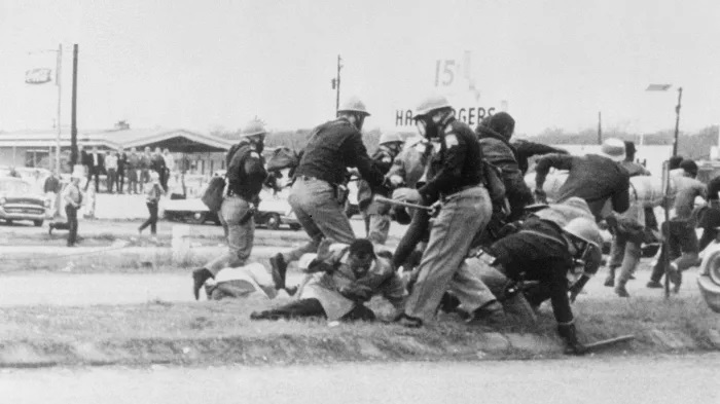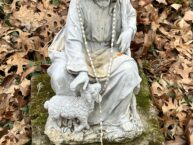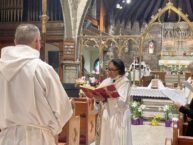 March 3, 2024: Let the words of my mouth and the meditation of my heart be acceptable in your sight, O God, my strength and my redeemer. Amen.
March 3, 2024: Let the words of my mouth and the meditation of my heart be acceptable in your sight, O God, my strength and my redeemer. Amen.
Well, here we are again, now in part 3 of this lectionary trilogy on covenant. Two weeks ago, it was God’s unconditional covenant with all creation following the great flood. Last week, it was God’s covenant with the descendants of Abraham, Sarah, and later Hagar. And today, we get another covenant. One that God makes with the people of Israel on Mount Sinai through the giving of the law – known as the commandments.
Now, these commandments, the Decalogue as it is also called, they are so very familiar… I mean – how many think of Charlton Heston, right?
Heck, you can Google 10 commandments and find them for just about anything – golf, marriage, men…. I even found one from a Cat, which included:
- Thou shalt have no other pets before me.
- Thou shalt be grateful that I even give thou the time of day.
And,
- Remember my food dish and keep it full.
Anyone who has ever lived with a cat can understand.
And while cats believe they are Gods, and they were once thought of that way in some cultures (something they never want us humans to forget), these commandments we heard today from the book of Exodus are the ones given to humankind by the one true God. They are so nice – we get ‘em twice – as they are also in the book of Deuteronomy. And to be clear, as my dear friend and colleague, Fr. Jim Warnke, once said “They are in fact commandments, and even though we are Episcopalians, they have not been renamed “The 10 Interesting Suggestions.”
Now, I started this sermon talking about these Lenten scriptures as being about covenant, and you may be left wondering – what have these commandments to do with that?
The thing is – the law we hear today is not about restricting us, quite the opposite. The commandments are really there to ensure that we stay connected in a relationship of respect, care, and love. They are about freedom and identity – ours and God’s.
A free life is one in which we recognize that we are God’s beloved children, and that all of creation is of God. A free life means we do not hurt our neighbor, we respect one another and God, we give ourselves Sabbath rest, we respect our elders, we are content enough in who we are that we have no jealousy of anyone or anything. For those searching for the purpose driven life – look no further. Because jealousy, hatred, disrespect, constantly working rather than constantly loving, all of it is a self-made prison.
These commandments of God aren’t complicated either. As Christ boiled it down for us: all 10 amount to doing two things: loving God and loving our neighbor as ourselves.
Well, and speaking of Jesus, he was not a happy guy today in the gospel, right? Our Lord and Savior went into the temple, found it filled with the folks who were using it to make a profit, often at the expense of the poor. They had defiled the place where others seek God by using it as a place to make a buck. The very place where one should be given restoration and renewal on the Sabbath had become a place where one was fleeced in order to follow some doctrine of conduct around sacrifice and coin imagery.
It was not always so – these money changing tables originally were meant to help people exchange Roman coinage for temple coinage, as the Roman coins had the image of the emperor on it – a symbol of idolatry not allowed in the sacred space of the temple. The tables were also there to allow people to purchase sacrificial animals to offer in thanksgiving – I know, horrific for us to consider today, but it was the practice of the faithful then. But greed had taken over, and these were now places where people were cheated in order to follow the temple laws.
If there was one thing Jesus was, it was a rule breaker – not because he didn’t value the temple or God’s laws, quite the opposite. His rule breaking was to remind us that we should never value doctrine over relationship with God and all of God’s creation, because in many respects that is worshiping idols – valuing human actions, rather than divine ones, as we heard Jesus say to Peter last week.
This is what following the commandments are all about. I know – no where in there does it say “Thou shalt overturn the tables of thy temples.” But if we follow them, there will be a need for us to do as Jesus did in the gospel, maybe not at houses of worship (but sometimes there – to be sure).
And this week our country remembers some folks who did exactly that – who followed the commandments by overturning tables of injustice.
March 7th is the 59th anniversary of “Bloody Sunday,” a pivotal moment in the civil rights movement, and boy did these brave souls knock over a few proverbial tables. In the words of the late, great, Rep. John Lewis, who was nearly killed that day, this is what happened:
“In Selma, Alabama, in 1965, only 2.1% of Blacks of voting age were registered to vote. The only place you could attempt to register was to go down to the courthouse. You had to pass a so-called literacy test. And they would tell people over and over again that they didn’t or couldn’t pass the literacy test. On one occasion, a man was asked to count the number of bubbles on a bar of soap. On another occasion, a man was asked to count the number of jellybeans in a jar. There were African American lawyers, doctors, teachers, housewives, college professors flunking this so-called literacy test. And we had to change that, so we sought to march.
And we got to the top of the bridge. We saw a sea of blue — Alabama state troopers — and we continued to walk. We came within hearing distance of the state troopers. And a man identified himself and said, “I’m Major John Cloud of the Alabama state troopers. This is an unlawful march. It will not be allowed to continue. I give you three minutes to disperse and return to your church.” And one of the young people walking with me, leading the march, a man by the name of Hosea Williams, who was on the staff of Dr. Martin Luther King Jr., said, “Major, give us a moment to kneel and pray.” And the major said, “Troopers, advance!” And you saw these guys putting on their gas masks. They came toward us, beating us with nightsticks and bullwhips, trampling us with horses.
I was hit in the head by a state trooper with a nightstick. I had a concussion at the bridge. My legs went out from under me. I felt like I was going to die. I thought I saw Death. All these many years later, I don’t recall how I made it back across that bridge to the church. But after I got back to the church, the church was full to capacity, more than 2,000 people on the outside trying to get in to protest what had happened on the bridge. And someone asked me to say something to the audience. And I stood up and said something like: “I don’t understand it, how President Johnson can send troops to Vietnam but cannot send troops to Selma, Alabama, to protect people whose only desire is to register to vote.” The next thing I knew, I had been admitted to the local hospital in Selma.”[1]
The scenes on the bridge shocked the nation, emboldening leaders in Washington to pass the Voting Rights Act five months later. John Lewis and all the others who left their church buildings to cross the Edmund Pettis bridge that day were people who truly knew what being a people of the covenant and followers of Jesus was all about. They understood that being a person of faith was about far more than going to church on Sunday. They knew that what you do when you leave the doors of your church is as important as what you do inside them. They knew that being a child of God means living as God calls us to live – loving God, loving neighbor, loving self. It wasn’t something doctrinal – it was an identity – an identity rooted in covenant – in relationship with God!
Being a child of God is an identity given freely to all of us from the moment we are born, and that means that we are meant to be in relationship with God and one another. We are essentially baptized in those birth waters into a creation of love – for love. And God calls us again and again to return home to who we are – to be the beloved child of God we are called to be, and to live into that promise for ourselves and our neighbors. The role of faith, the role of the church, the whole purpose of all of God’s interactions with us through the course of history, is to remind us of that – to remind us of who we are. That is what Lent is all about too – returning home to who we are. It is about remembering our identities as those who claim to be followers of Jesus, and what that really means for us.
Because being a Christian isn’t about rules, doctrine, or dogma – not really. They are the things we would do naturally and freely if we understood who we are – and so they remind us of our identity. It isn’t about committees, vestries, dioceses, conventions – those offer us a way to serve Christ together.
But being a follower of Jesus IS about what we do in the world, and what we do here.
It IS about loving neighbor – fighting for the oppressed, working to bring people out of the dark corners of marginalization, speaking out against anyone or any system that seeks to harm any child of God.
It IS loving God through loving what God has entrusted to us – working to ensure that creation – the animals, the earth, the sea, and the sky is treated with respect and cared for – being the good stewards God asked us to be.
And – it IS about loving God and loving ourselves – remembering to honor the Sabbath by taking time to come here, to give thanks for all that we are given, to be nourished with the body and blood of Christ, to be strengthened by the fellowship of community, and to remember that we are loved – unconditionally and for all time.
That is what it means to follow Jesus.
Rep. John Lewis and the others knew that as they bravely marched across that bridge on that Sunday in March of 1965.
Many years later, Rep. Lewis often said when speaking about that moment “Get in good trouble, necessary trouble, and redeem the soul of America.” That’s a good message for us today too.
The commandments are a covenant – a reminder of what our identity means. That we are beloved children of God, called to a relationship of love with our Creator and with all of God’s creation. To live into this covenant, followers of Jesus must live as he modeled for us. And that will take coming here for strength and restoration at this table, and then leaving from here and getting into some “good trouble, necessary trouble,” for the redemption of the world, and of our own souls.
Amen.
For the audio, click below, or subscribe to our iTunes Sermon Podcast by clicking here (also available on Audible):
[1] https://www.democracynow.org/2020/7/20/remembering_john_lewis_selma_voting_rights
The Rev. Diana L. Wilcox
Christ Church in Bloomfield & Glen Ridge
March 3, 2024
Third Sunday of Lent
1st Reading – Exodus 20:1-17
Psalm 19
2nd Reading – 1 Corinthians 1:18-25
Gospel – John 2:13-22






